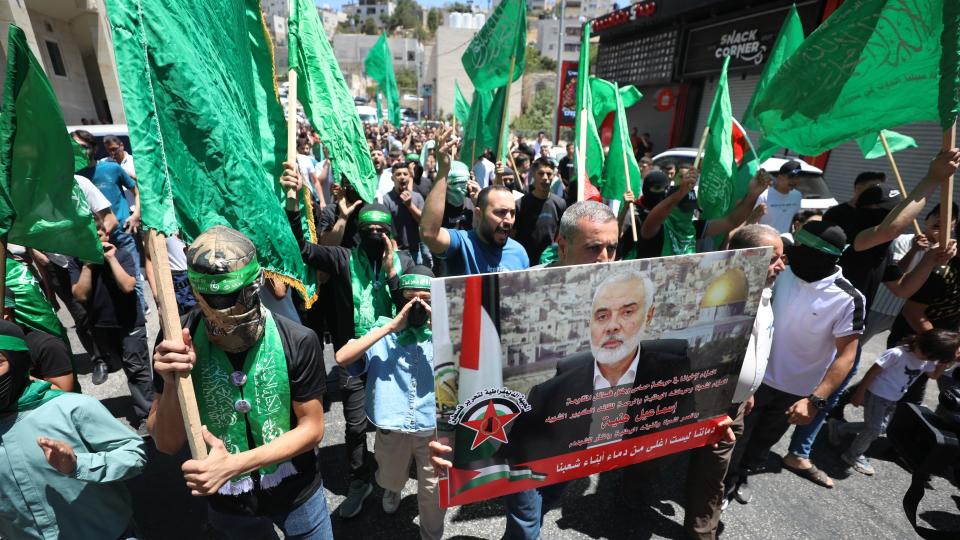When you buy through links on our articles, Future and its syndication partners may earn a commission.


Iran has vowed revenge on Israel after the political leader of Hamas, one of its key regional proxies, died in a rocket strike in Tehran today.
Ismail Haniyeh, one of the most senior Hamas members, was killed in a “treacherous Zionist raid”, said the militant group. Haniyeh was in the Iranian capital for the inauguration of the new president Masoud Pezeshkian – who has vowed to make Israel “regret its cowardly action”. Israel will face a “harsh and painful response”, Iran’s Revolutionary Guard Corps (IRGC) said in a statement.
Israel hasn’t acknowledged the strike but had vowed to kill Haniyeh and other Hamas figures after the 7 October massacres. Israel did, however, claim responsibility for killing senior Hezbollah commander Fuad Shukur in Beirut a few hours earlier. The “precision strike” in the Lebanese capital was in retaliation for the rocket attack on Saturday, attributed to Hezbollah, that killed 12 people, including children, in occupied Israeli territory. The two deaths of leaders from Iran’s key proxies – one on Iranian soil – threatens to ignite the tinderbox of tensions between the long-time foes.
“You killed our dear guest in our house and now have paved the way for your harsh punishment,” said Supreme Leader Ayatollah Ali Khamenei. “We consider it our duty to ask for the blood of our dear guest.”
What did the commentators say?
Israel may never acknowledge the strike, but “everyone assumes” this was an Israeli operation, said the BBC‘s Paul Adams in Jerusalem. As such, Israel will face “political consequences”.
The “most obvious” is that Haniyeh’s death will “damage” efforts to negotiate a ceasefire in Gaza, and imperil the return of the remaining Israeli hostages. Haniyeh was a “critical interlocutor” in the negotiations. Now, it is “extremely hard” to see how progress can be made.
“How can mediation succeed when one party assassinates the negotiator on other side?” said Mohammed bin Abdulrahman Al-Thani, the prime minister of Qatar, the site of Hamas’ political bureau. A key mediator, he wrote “Peace needs serious partners & a global stance against the disregard for human life,” on X.
Internationally, Israel is facing further widespread condemnation. Turkey’s Recep Tayyip Erdogan called it a “treacherous assassination” and “Zionist barbarism”. Russia’s foreign ministry warned of “dangerous consequences for the entire region”, with the deputy foreign minister calling it an “absolutely unacceptable political murder”. China also firmly condemned the “assassination”.
Israel’s most important ally, the US, has not yet commented, but defence secretary Lloyd Austin said “we’re going to do everything we can to keep things from turning into a broader conflict in the region”.
Domestically, however, the two deaths may present a tactical victory for Benjamin Netanyahu, who is fighting for his political survival amid increasing pressure from far-right ministers. Dozens of protesters – and a few conservative members of the Knesset – stormed a detention centre in Israel on Monday, in a show of support for soldiers accused of mistreating a Palestinian prisoner. The Sde Teiman base had become a “symbol of the war” between Israel and Hamas, said The Jerusalem Post; the riot was “disastrous”.
But all eyes will be on Iran’s response to both strikes. Hezbollah is Iran’s “mightiest ally”, said The Times‘ Middle East correspondent Samer Al-Atrush. Tehran is the capital of Iran’s “axis of resistance“, which includes Hamas, Hezbollah and Yemen’s Houthi rebels. They had “all converged” in the city for Pezeshkian’s inauguration. Haniyeh’s assassination in Tehran is a “deep embarrassment” to Iran, which “nearly went to war with Israel” after an airstrike killed its top commander in Syria in April.
What next?
Palestinian factions in the Israeli-occupied West Bank have called for a general strike and protests today. Haniyeh’s funeral will be held in Tehran tomorrow before his body is transferred to Qatar for burial on Friday. Iran will observe three days of public mourning, according to the state-run IRNA news agency.
The “unprecedented” deaths have “totally changed the dynamic” between Iran-backed proxies and Israel, said Firas Maksad, senior fellow and senior director for strategic outreach at the Middle East Institute. There’s a “great possibility” of an “orchestrated region-wide campaign” by Iran’s militias and “maybe even Tehran itself in a direct response on Israel”, Maksad told CNN.
But Iran’s options for response are “limited and none of them are great”, said CNN. Israel has demonstrated an “extraordinary capability” to assassinate senior figures of Iranian proxies. “Yet still, red lines were again crossed, and another rung on the ladder of escalation has been climbed.”





